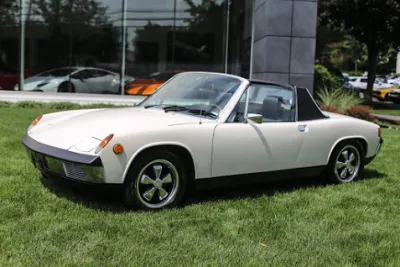Collection
By the late 1960s, both Volkswagen and Porsche were in need of new models; Porsche was looking for a 912 replacement to be their entry level model, and VW wanted a new range-topping sports coupe. At the time, the vast majority of VW's developmental work was handled by Porsche, part of a setup that dated back to Porsches founding; VW needed to contract out one last project to Porsche to fulfill the contract, and decided to make this that project. Originally intending to sell the vehicle in four-cylinder trim as a Volkswagen and in six-cylinder trim as a Porsche, Porsche decided during development that having Volkswagen and Porsche models sharing the same body would be risky for business in the American, and convinced Volkswagen to allow them to sell both versions as Porsches in North America. During the 5 year production run 3333 914’s were manufactured, the majority, 2760 were produced in 1970.
Porsche's 914/6 variant came with a carbureted 110 hp 2.0 L flat-six engine, taken from the 1969 911T. Karmann manufactured the rolling chassis at their own plant, then either sent them to Porsche for fitment of the Porsche suspension and flat-six engine or kept them in house for Volkswagen hardware. 914/6 models used a similar suspension and brakes to the 911, giving the car handling and braking superiority over the 4-cylinder Volkswagen models in addition to higher power output.
Slow sales and rising costs prompted Porsche to discontinue the 914/6 variant in 1972 after producing 3,351 of them.
The 914 was Motor Trend’s Import Car of the Year for 1970 and a 914/6 piloted by Frenchmen Claude Ballot-Lena and Guy Chasseuil won the GTS class at Le Mans in 1970 and finished sixth overall.

